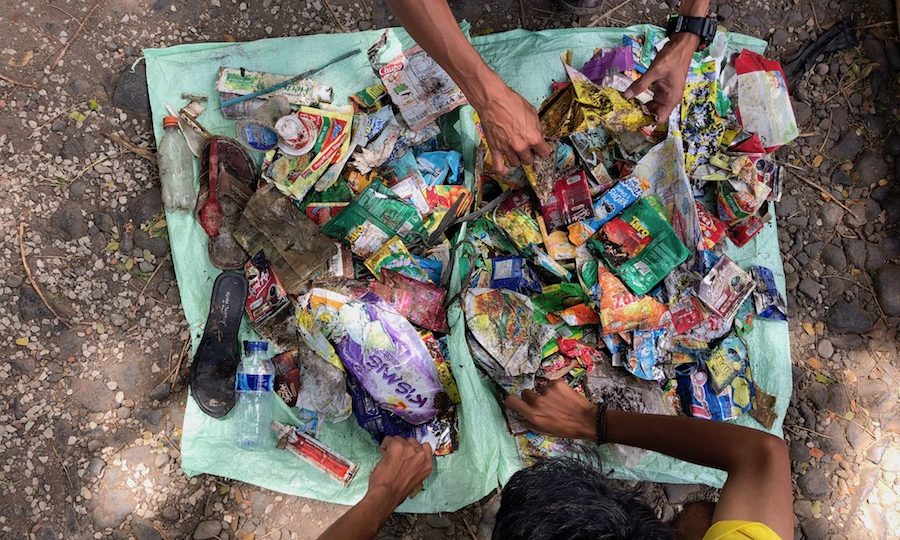Bogor, a city just south of Jakarta, has long been accused by those downstream to the north of being “senders of garbage.” While a convenient excuse for many littering Jakartans, there is an element of truth to the claim, as tons of garbage flow toward the capital via the Ciliwung River — which runs through both cities — with no end in sight.
That’s not to say all Bogorites are content having the blame placed on them. Some, like the volunteers at Komunitas Peduli Tjiliwoeng (Ciliwung Care Community), are taking a two-pronged approach to transforming the notoriously filthy river: 1) physically picking up the garbage themselves, and 2) pressuring local governments to enact policies that can change the mindset of locals.
“Yes, of course we must accept it,” Komunitas Peduli Tjiliwoeng volunteer Soeparno Jumar told us regarding Bogor’s unenviable reputation.
“That’s why we act.”
For the past 10 years, the community’s volunteers have routinely carried out river clean-ups along the banks of Ciliwung, mostly in Bogor and sometimes in Jakarta, too. On March 23 (which fittingly fell a day after World Water Day), the community held one of its weekly clean-up events in a North Bogor neighborhood, where the river banks were more filthy than first meets the eye.
Check out Coconuts TV’s accompanying video about Ciliwung River:
https://www.youtube.com/watch?v=_3iaKmRTuds
All in (less than) a day’s work
Dozens of volunteers had already gathered in the riverside neighborhood by 8 am. It wasn’t until 10 am, after seemingly endless speeches by local officials, music performances and breakfast with coffee, that volunteers, in groups of three or four, were given sacks and began heading down the steps to the riverside.
The plastic pollution was not initially as striking as one may have come to expect from the Ciliwung’s notoriety in years past. In fact, it seemed to us that clean up efforts like these were making a huge difference.
That is, until we looked closer.
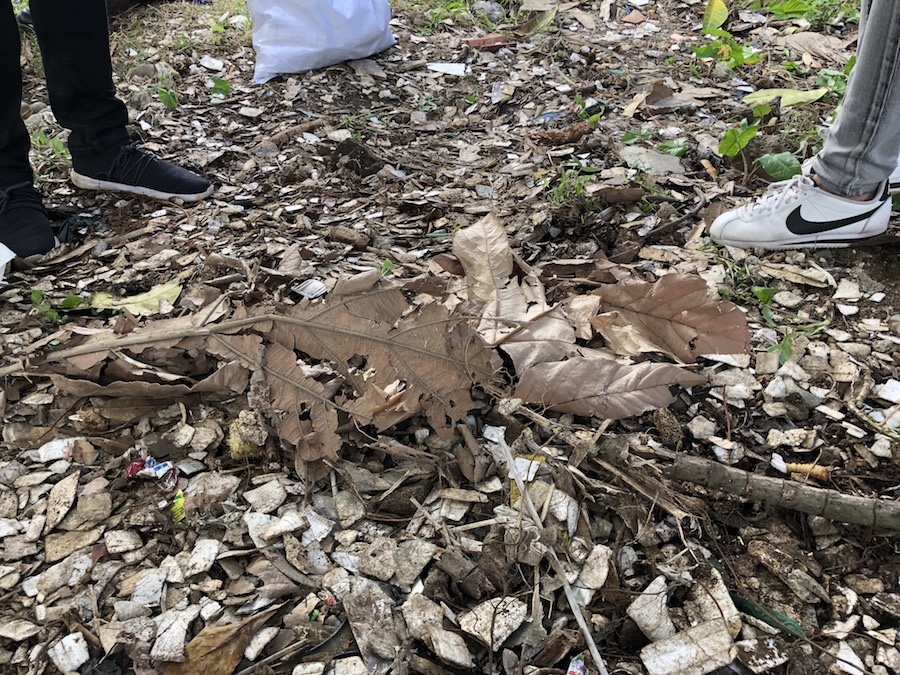
Plastic waste in the area was mostly invisible upon first glance because much of it had already been buried in dirt and mud along the river. Natural vegetation had grown alongside instant noodle cups, styrofoam, and candy wrappers, as if they had become one with the ecosystem. The irony, of course, is that the plastic waste will outlast most of the flora and fauna in the area by hundreds of years.
Ana Noor, a volunteer from Jakarta, spent 30 minutes picking up trash in one tiny spot, yet wasn’t able to completely clean her area as the earth beneath her seemed to ceaselessly spew out garbage.
“In just one spot, I kept digging deep, and more and more trash kept coming out. It’s not just plastic, there was cloth, zippers, and I don’t know how long they’ve been there. And it was all wet,” she said.
Not all immediately crouched down to pick up trash at the site. Some, including local officials and neighborhood residents, seemed to be participating for appearances’ sake, especially where selfies were concerned.
The morning heat contributed to a contradictory sense of aridness in the middle of the lush, green scenery. It’s no wonder then, that less than an hour after the clean up began, all but a dedicated few — namely professionals from the city’s sanitation department — had already made their way back up to the neighborhood for lunch and entertainment.
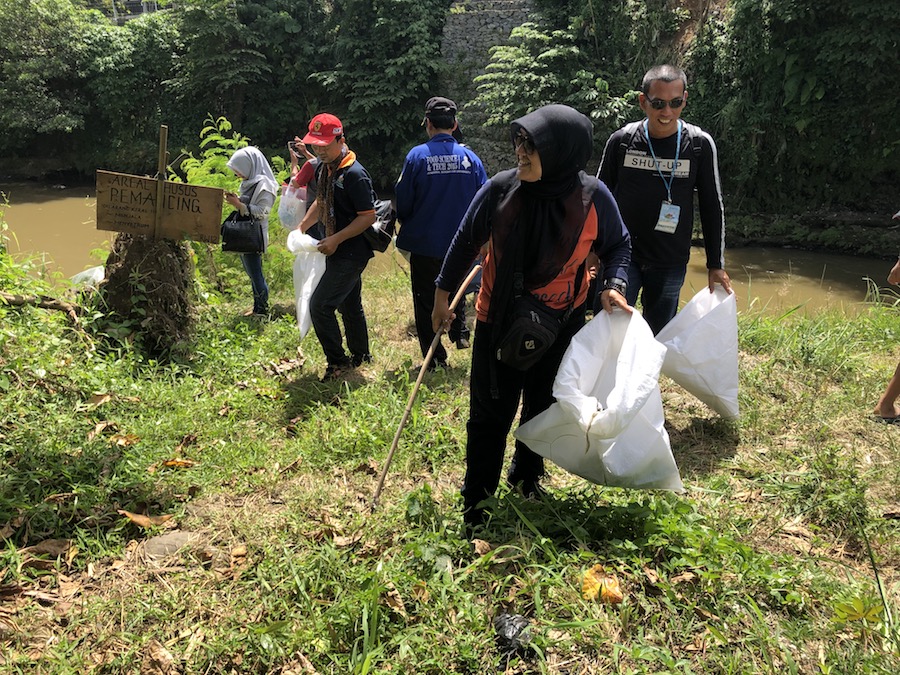
“This is my first time volunteering to clean up a river. I probably won’t go to another one unless the people genuinely care about cleaning the river,” Ana said.
Cleaning to raise awareness
Despite collecting a truck load of garbage, the difference before and after the clean up at the site was negligible at best.
This is just one settlement of many along the 119 kilometer-long Ciliwung, which spans two provinces. The folks at Komunitas Peduli Tjiliwoeng are under no illusion that dozens of people volunteering their time to do semi-regular clean-ups will ever totally heal the filthy river.
That’s why the community has directed much of their efforts to finding more persuasive means to get people to stop littering, namely lobbying local governments to pass and actually enforce fines for dumping waste into the Ciliwung.
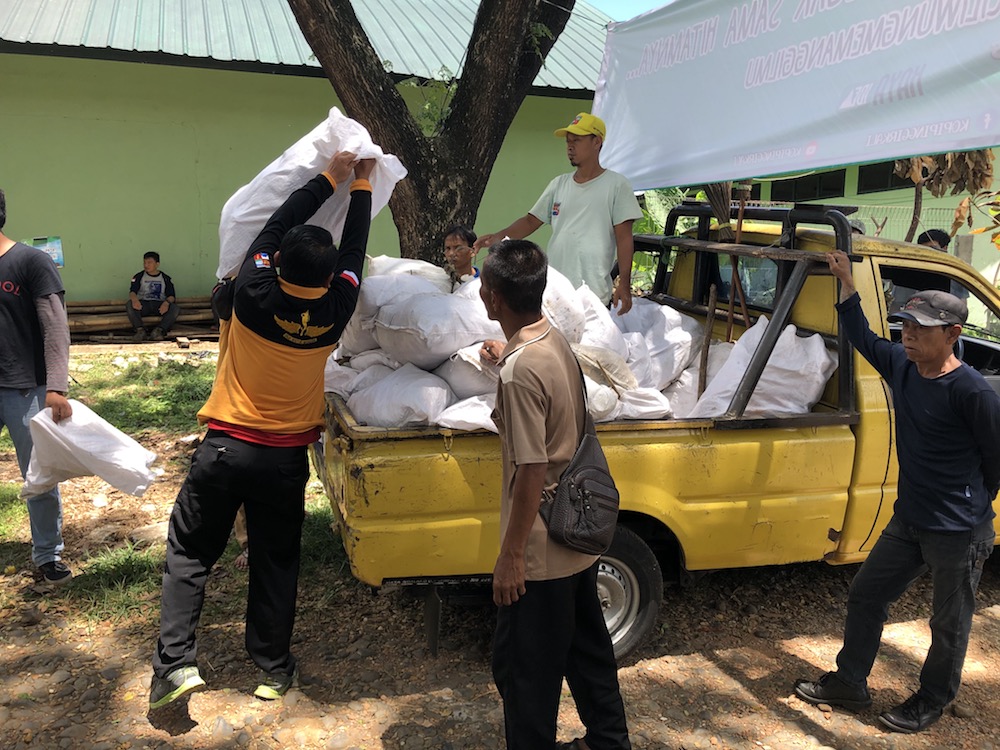
“Now the litter we pick up has decreased over the years. That’s thanks to the formation of a Task Force in Bogor earlier this year, which involves authorities doing daily patrols, from Monday to Friday, 9 am to 4 pm, along the Ciliwung to stop residents of villages on the river banks from littering,” Soeparno said.
“There’s a sense of shame now in littering because of the patrols, which are, in a way, educating the people.”
There’s also the matter of an IDR 500,000 (US$35) fine for anyone caught dumping refuse in the river.
A small glimpse into a huge problem
Indonesia holds the unfortunate distinction of being the world’s second-largest producer of plastic marine waste, behind only China. A great deal of that waste comes from the 9.8 billion(!) plastic bags the country is estimated to use each year.
A study in 2017 showed that, of the 20 rivers contributing the most plastic marine waste in the world, four are located in Indonesia. Even though the Ciliwung is not one of the four, it’s still among the most-polluted in Indonesia, with viral stories about huge amounts of plastic waste found on the river popping up with depressing regularity.
Nationally, the Indonesian government has repeatedly acknowledged the country’s plastic waste problem, with the current administration pledging to reduce plastic waste by 70% by 2025.
To the casual observer, there seem to be reasons for optimism that Indonesia might reach that difficult target, as several regions are waking up to the dangers of plastic waste.
Bogor, for one, has banned the use of single-use disposable plastic bags. Jakarta is expected to follow suit sometime this year, pending approval by Governor Anies Baswedan. More recently, convenience stores around the country were instructed to no longer give out free plastic bags.
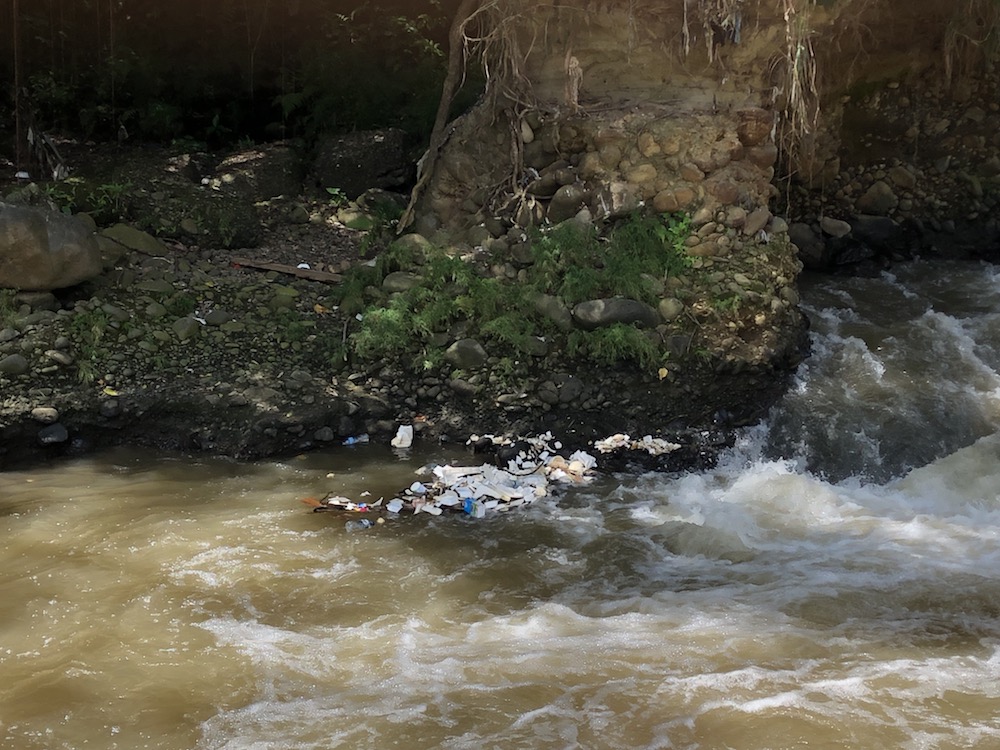
But to those who deal with the problem on a day-to-day basis, the government’s target is nothing but a pipe dream.
“We still can’t see the government’s commitment, let alone real steps to reduce the source of garbage,” Dicky Lubis, coordinator of the #SayaPilihBumi (#IChooseEarth) campaign, which aims to imbue the public with a desperately needed environmental consciousness, said in a recent interview.
“Recycling centers on their own are not enough. It must be accompanied with educating the public about waste, such as reduce, reuse, recycle.”
Lubis is of the belief that any government plan will be futile if it doesn’t face the problem directly at its source.
“Our problem is still basic and primitive, in that we must be disciplined in throwing garbage where it should go. But, on the other side of the coin, if we have tossed garbage in the right place and the waste has been separated by type, in the end, the garbagemen just toss them all together into a landfill,” he said.
“[Ultimately] our mindset is that many still think that someone else will clean it up. There is still that culture of laziness.”
That culture, if it prevails, is why any effort to clean up rivers like the Ciliwung will be futile in the long run. If we in Indonesia already had a real collective concern regarding littering, there wouldn’t be a need for groups like Komunitas Peduli Tjiliwoeng, #SayaPilihBumi, or weekly river clean-ups. But we don’t, and our rivers are filthy through no fault of any specific person/group.
It’s on the litterbugs.
It’s on industries as well as households.
It’s on the neighborhood official, who, right after her rousing speech encouraging locals to clean up the river, dropped her sack on the ground and took selfies with locals before leaving the clean-up site.
It’s on the children who tossed their candy wrappers during the clean-up.
As such, it’s on the parents, too.
It’s on all of us.
